Seeds of Change: How 3 Moms Provide Produce to Needy Families
Living in certain areas of the country makes it even more difficult than usual to whip up a healthy meal. Featured in this story are three women who are reaching out to help less fortunate families that lack access to high-quality foods and produce.
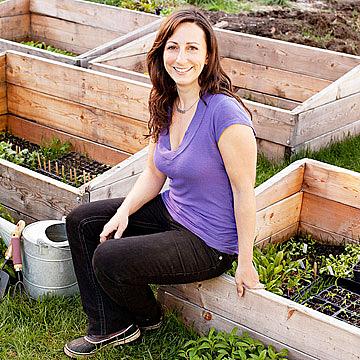
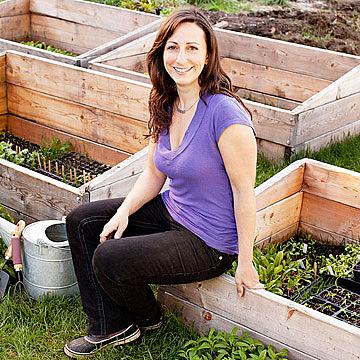
For millions of moms, providing a healthy dinner is far harder than just inventing new ways of disguising broccoli. These parents live in areas of the country without easy access to affordable, quality groceries. If you don't have a car, and the nearest full-service supermarket is miles away, you end up relying on convenience stores filled with fatty, high-salt, processed options and little in the way of fresh fruits and vegetables. The consequences of eating like this include obesity and related illnesses, such as diabetes, heart disease and cancer—problems that cut years off life expectancy. But these three enterprising women have found ingenious ways to bring free or low-cost produce to families most in need.
Stacey Murphy, 37
Founder, BK Farmyards
Brooklyn, New York
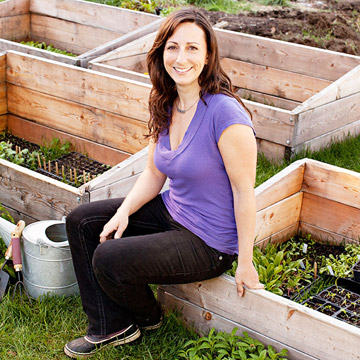
Photo: Tara Donne
Sprouts of an Idea
"I spent my entire childhood in my mom's garden," says Stacey. "She had a mini farm in our suburban backyard and everything we grew went directly to our dinner table. I didn't taste my first french fry until I was 16." Later, working in Manhattan as an architect, she would pass through a greenmarket on her way to the office and stop to chat with the farmers. "I wasn't feeling passionate about my profession," she says. "When I talked to people who were growing things, I realized what I really wanted wasn't to build high-rises but to create communities." Around the same time, Stacey noticed that many of her Brooklyn neighbors were barely using their yards, and she hit upon an idea: Turn those spaces into small urban farms and share the crops with the homeowners and other local residents, who would provide the labor. By spring 2009 she had saved enough money to quit her job and launch her new enterprise.
Taking Root
Within months Stacey was growing 50 different varieties of produce, including beets, collard greens, bok choy and broccoli rabe, on two lots. Then, in the fall, she got a call from Ben Shuldiner, principal of the High School for Public Service, which is situated in a low-income Brooklyn neighborhood. Ben thought Stacey might be the right person to implement his dream of converting the school's one-acre front lawn into a working farm. Two months later, with the help of a small grant, she began the project.
The Harvest
In the spring of 2010 the first greens came up, a salad mix. Stacey invited the kids working with her to pick a few leaves and have a taste. "I had to convince some of them," she says. "One said, 'I'm not eating that. It just came out of the ground!'"
The students have come a long way since. They're involved in every aspect of farming, from building compost bins to staffing the stands at the school's weekly market. Last year 9,000 pounds of produce was sold, mostly to nearby residents, many of whom made their purchases with food stamps. Some of the students take vegetables home and prepare for their families recipes they learned at school.
The farm employs 10 teens during the summer to help with chores, and Stacey has noticed something remarkable: Many of the kids have given up going to the corner store for sugary afternoon snacks. Instead, they linger around the picnic table where Stacey and her colleagues are topping sandwiches with cucumbers, tomatoes and lettuce straight from the garden. "They'll say, 'Uh, are you going to eat the other half of that cucumber?'" Stacey says. "My biggest takeaway from this experience is that when given a choice, most kids will go for fresh, delicious food. And there's nothing as thrilling as seeing the look of awe on their faces when they bite into a just-picked Sungold tomato for the first time."
Stacey's Raw Kale Salad
Teens love this one! Cut 1 bunch of kale (preferably Lacinato), 1 bunch parsley and 1 bunch spinach into long, thin strips. Juice 2 lemons, mix with a dash of apple cider vinegar and pour over the greens. In a small bowl, combine 1/4 cup olive oil and 3 tablespoons each pure ground peanut butter and honey. Pour over the salad and toss. Season with salt and pepper to taste. Top with sesame seeds or garbanzo beans, if you like.
Tanikka Cunningham, 32
Founder and Executive Director, Healthy Solutions
Washington, D.C.
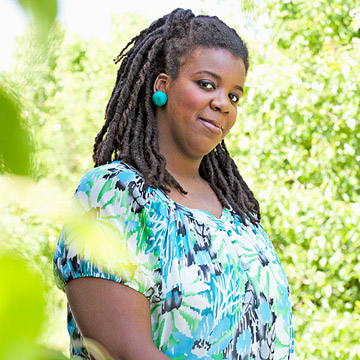
Photo: Malek Naz Freidouni
Sprouts of an Idea
Tanikka was looking for a good way to earn income, and on a whim she answered an ad about providing wholesale produce to schools, military bases and prisons. She won the contracts, put into play the farming knowledge she'd acquired as the granddaughter of sharecroppers, and the company took off. But when she discovered that prison inmates were served an apple a day while fruit was only an occasional treat for local school kids, her business morphed into a mission. Tanikka began setting up nutritional outreach programs called Healthy Eaters Future Leaders in North Carolina. The plan was to provide wholesome snacks to students, and prizes for the classes that consumed the most servings of fruits and vegetables. But it soon became clear that more was required. "Mothers would tell me they were thrilled their children were eating well during the day, but they couldn't afford to feed their families like that at home," says Tanikka, a mom of four, ages 8, 6, 4 and 2. "I knew there had to be a way."
Taking Root
Around that time Tanikka discovered that small farmers were selling their produce at cut-rate prices, then throwing out what they couldn't sell, simply because they didn't have refrigeration. With a modest government grant, she arranged to buy those crops wholesale and hire trucks to transport the goods. She organized the project into the nonprofit Healthy Solutions, and set up distribution centers (which she calls "farmers' markets without the farmers") at churches and community centers.
Staffed by teenagers from area high schools, these outlets offer "Freggies," baskets that include a variety of in-season produce—kiwis from Pennsylvania, sweet potatoes from North Carolina and cherries from Maryland. A 20-pound container, enough to feed a family of four for a few weeks, sells for $25—about half what it would cost at a store. Tanikka accepts food stamps too, which has increased the project's impact on nearby households.
The Harvest
Bringing in more than 15,000 pounds of produce a month to Washington, D.C., Healthy Solutions feeds over 3,500 families. Tanikka's most recent venture is a market in Thomaston, Alabama, a rural town of just 354 residents that has never had a grocery store. "All it takes to change people's lives," she says, "is tying up a few loose ends and looking at challenges from a different perspective."
Tanikka's Summer Squash Medley
Heat oven to 350 degrees F. Slice 2 large or 3 small yellow squash and 2 large or 3 small zucchini into 1/4-inch coins. Cut 1/2 of a sweet red pepper into large chunks. Put vegetables onto cookie sheet and toss with enough olive oil to lightly coat. Roast in 350 degrees F. convection oven for 10 to 15 minutes, 350 degrees F. traditional oven for 15 to 20 minutes or until squash start turning transparent and peppers begin to char. Some cooks like to include a sweet onion or tomato. Toss, serve and watch it all disappear!
Lisa Johanon, 50
Founder, Peaches & Greens
Detroit, Michigan
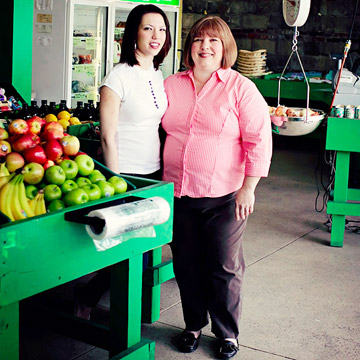
Photo: Cybelle Codish
Sprouts of an Idea
When Lisa was a teen, she volunteered in Detroit's ailing inner city—and that's where she and her husband, Dan, decided to live when they got married. "We believe the best way to help is to find out firsthand what's needed," she explains. She created Central Detroit Christian Community Development Corporation to provide tutoring, job training and housing assistance. Meanwhile, though, she struggled to find nutritious food for her family in an area where liquor stores outnumber grocers 23 to 1. "I had a car and could drive 10 miles to find things I'd feel good about serving," Lisa says. "But many of my neighbors had no way to do that." The need became even more urgent when her two children came along.
Taking Root
In the summer of 2008, Lisa bought an old UPS truck on Craigslist for $5,000, outfitted it with a refrigerator, packed it with fresh fare from the wholesale produce terminal and dispatched it to the city streets. A loudspeaker played R&B music while the driver announced, "Peaches and greens, nutritious and delicious!"
The Harvest
From the beginning, Peaches & Greens was a hit, bringing out enthusiastic moms as well as grateful seniors and kids, who'd pick out an apple or peach for a quarter. That success inspired Lisa to open a Peaches & Greens store and cafe, and to start two community gardens. Everything is operated with the help of local tweens and teens, who earn a share of the income generated. Lisa's own son and daughter, now 18 and 20, regularly clock weekend and vacation hours busing tables at the cafe or planting and weeding the gardens. In May 2010 Michelle Obama rode in the truck, cheering its role in boosting healthy eating. "The visit was wonderful," says Lisa, "but what feels best is knowing we're satisfying the needs of our community. Peaches & Greens may not have changed the world, but now kids on Calvert or Hazelwood streets can enjoy fresh strawberries and watermelon in season."
Lisa's Tomato Salsa
Finely chop 2 to 3 tomatoes or 1 1/2 pounds cherry tomatoes, 2 to 3 green onions and 1 large yellow or white onion. Add to a large lidded storage container. Stir in 2 to 3 tablespoons lime juice, 1/2 cup cilantro, chopped, 1/2 to 1 green bell pepper, finely chopped, 3 to 4 cloves chopped garlic and 1 seeded and finely chopped chile pepper, if desired. Add 1 to 2 cups thawed frozen corn; stir in salt and pepper to taste. Cover and shake to mix. Enjoy! (Salsa's not an exact science—feel free to add or subtract ingredients.)
detcdc.org >>
Originally published in the August 2011 issue of Family Circle magazine.

